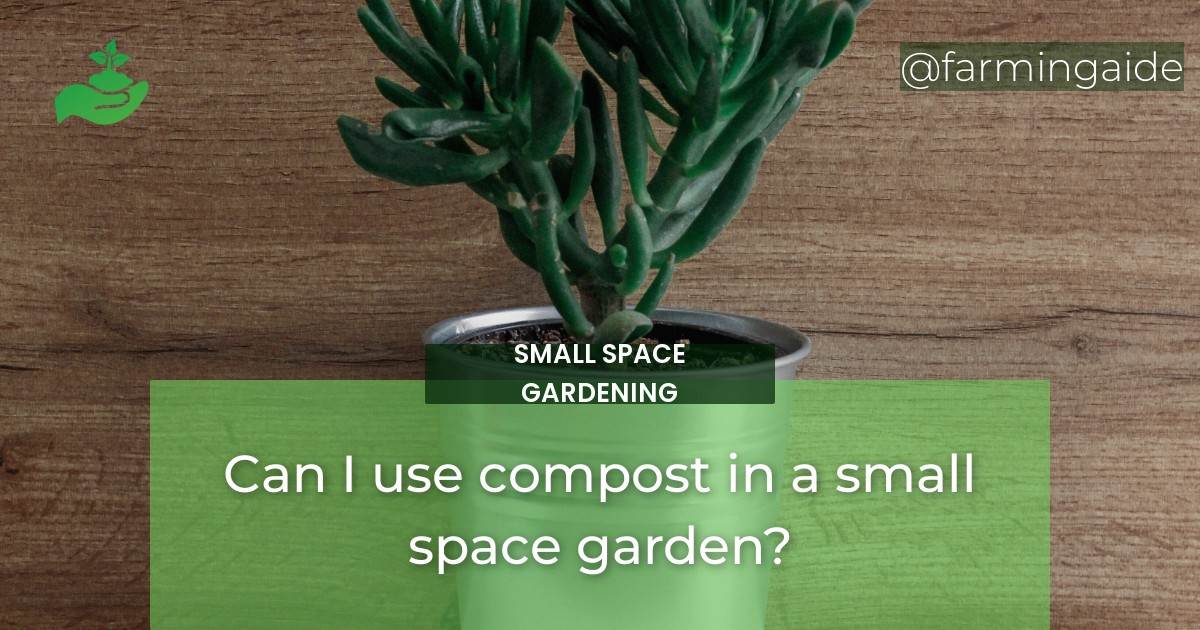Composting in small areas has become increasingly popular, especially for those who want to grow their own fresh produce but don’t have a lot of outdoor space. Utilizing compost in small space gardening is an excellent way to improve soil health, increase the amount of nutrients in the soil, retain more water, and reduce landfill waste. In this article, we’ll cover the benefits of composting in small space gardens, composting methods for small spaces, how to choose the right compost for your garden, how to use compost in small space gardens, and tips for successful composting in small spaces.
Benefits of Composting in Small Space Gardens
Improved Soil Health
The microorganisms found in compost help to break down organic matter, such as food scraps and yard waste, into nutrients that can be easily absorbed by plants. This process helps to improve soil health, making it more fertile and better able to support plant growth.
Nutrient-Rich Soil
Composting also enriches the soil with essential nutrients like nitrogen, phosphorus, and potassium. This is especially important for small space gardens, where soil can become depleted quickly.
Increased Water Retention
Compost helps soil to retain more water, which is crucial for small space gardens where plants are often grown in containers. Compost acts as a sponge, soaking up excess water and releasing it slowly over time.
Reduced Landfill Waste
Composting is an excellent way to reduce the amount of waste that ends up in landfills. By composting food scraps and yard waste, you can create nutrient-rich soil for your small space garden while reducing your carbon footprint.
Composting Methods for Small Spaces
Tumbler Composting
Tumbler composting is a great choice for small spaces because it’s compact and can be easily turned. A tumbler compost bin can be placed on a balcony or patio and requires little maintenance.
Vermicomposting
Vermicomposting, or worm composting, is an excellent choice for those with limited outdoor space. All you need is a worm bin and some food scraps, and you can create nutrient-rich compost for your small space garden.
Bokashi Composting
Bokashi composting is a fermentation process that uses a special type of bacteria to break down organic matter. It’s an excellent choice for small space gardens because it can be done indoors and doesn’t produce any unpleasant odors.
ALSO READ
Choosing the Right Compost for Small Space Gardens
Understanding Compost Labels
When choosing compost for your small space garden, it’s important to read the labels carefully. Look for compost that is organic and free from pesticides and other harmful chemicals.
Determining the Right Compost for Your Garden
The right compost for your garden will depend on the types of plants you’re growing and the soil conditions in your area. Consider factors like pH levels and nutrient content when choosing compost for your small space garden.
How to Use Compost in Small Space Gardens
Container Gardening
Compost can be added to container gardens to improve soil health and increase nutrient content. Be sure to mix compost with soil thoroughly before planting.
Raised Bed Gardening
Raised beds are an excellent choice for small space gardens. Compost can be added to raised beds to improve soil health and increase nutrient content.
Vertical Gardening
Compost can also be used in vertical gardens to improve soil health and increase nutrient content. Consider using a potting mix that contains compost for best results.
ALSO READ
Tips for Successful Composting in Small Spaces
Balancing the Compost Mixture
It’s important to balance the carbon-rich materials, like leaves and straw, with nitrogen-rich materials, like food scraps and grass clippings, when composting. A good rule of thumb is to use a 2:1 ratio of carbon to nitrogen.
Choosing the Right Container
The right composting container will depend on the amount of space you have available and the composting method you’re using. Consider factors like ventilation, drainage, and ease of use when choosing a composting container.
Maintaining the Compost
Maintaining the compost is crucial to its success. Be sure to turn the compost regularly to aerate it and add water as necessary to keep it moist.
Conclusion
Composting is an excellent way to improve soil health, increase nutrient content, and reduce landfill waste in small space gardens. By understanding compost labels, choosing the right composting method, and following tips for successful composting, you can create nutrient-rich soil for your small space garden and enjoy fresh, homegrown produce.


